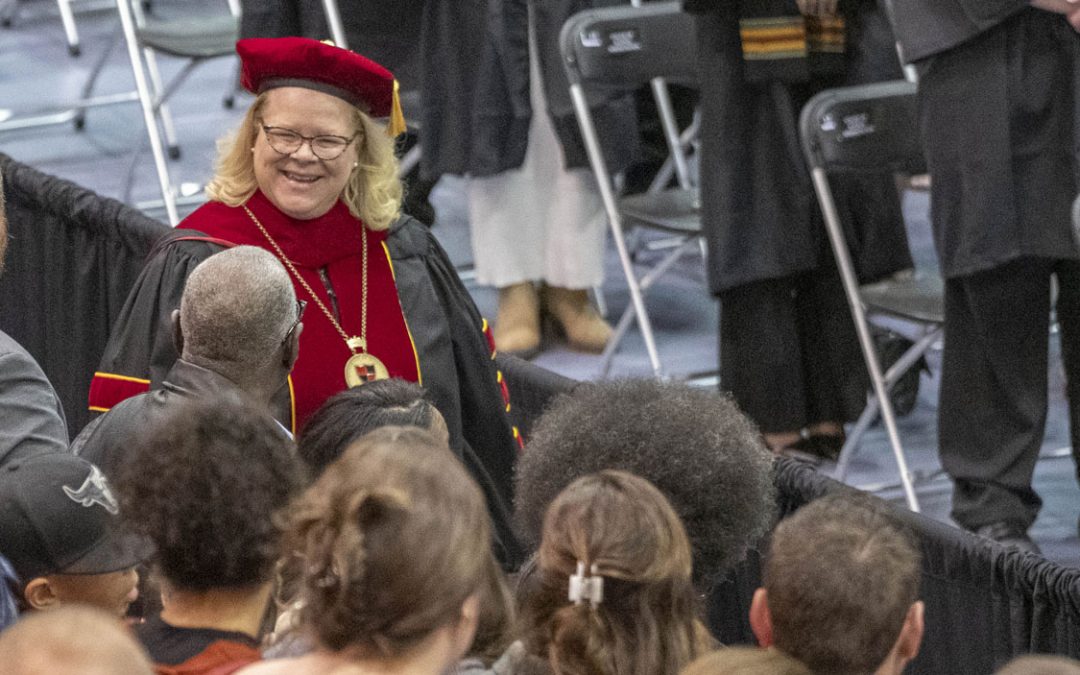
Assistant Teaching Professor Jill Bernard Bracy reviews a project from one of her UMSL marketing students. Bracy currently teaches undergraduate marketing courses and will also take on an introductory supply chain course during the summer semester. (Photo by August Jennewein)
Jill Bernard Bracy was working through a teaching lesson recently when she shifted the instruction for a moment to one of her University of Missouri-St. Louis students.
The evening class session, which was mostly filled with nontraditional students, was focused on marketing research. As Bracy outlined a few studies, one student asked if he could speak about a project he was working on for his company. Bracy agreed and let the student share about his work for the majority of the class period.
“He taught half of the class period telling his classmates about a current project at work,” Bracy said. “The students loved it, and it was absolutely perfect to illustrate what we were talking about. You don’t always get that at other universities because they don’t have this same student population.”
Serving UMSL’s student body, which has an average undergraduate student age of 25.5, is one of the elements Bracy enjoys most about her role as an assistant teaching professor in the College of Business Administration.
She returned home to UMSL, the school from which she earned a PhD in business administration, in 2017 to teach undergraduate courses in marketing. Within the few semesters she’s been on campus as an instructor, Bracy has come to appreciate the quality and tenacity of her students.
“I love being in the classroom,” Bracy said. “The student population here really recognizes the value of their education. They see that they are here because it is going to help them to do better in life, advance in their careers or get different jobs. They truly see the value their education is going to have on their futures. They bring great questions and apply what they are learning to their everyday lives.”
While Bracy balances a busy research load, heavy involvement in industry councils and a new role as the interim director of the Center for Transportation Studies, she still points to teaching as her favorite element of the job.
Bracy’s passion for teaching began when she was pursuing an MBA at Southern Illinois University Edwardsville. The school offered her a graduate assistantship, which led to positions as a research assistant and then a teaching assistant.
“My career just kind of propelled from there,” Bracy said. “It all started as a graduate assistant at SIUE. I really enjoyed the academy, constantly learning new information and being able to disseminate that information. My job is to study and then tell people what I’ve learned – from a teaching standpoint and a research standpoint. I thought that was really cool.”
Today, what she’s learning is centered around highway safety and transportation issues.
Bracy was always interested in marketing, but during her career in the industry, she became compelled to better understand how placement plays a role in successful marketing. She determined that if she was going to analyze the place element of marketing, she should study supply chain. And if she were to study supply chain, she should do that at UMSL.
That brought her to the College of Business Administration as a PhD candidate seeking an emphasis in logistics and supply chain with marketing as a supporting field. Then as she pursued her doctorate, Bracy became more and more interested in transportation – eventually focusing her dissertation on modeling techniques used to analyze motor vehicle accidents.
She continues to look at crash severity with a recent study on differences in driving behavior between male and female truck drivers.
“For male CDL drivers, aggressive behaviors such as driving too fast for conditions and failing to yield are significant contributors to severe crashes, whereas for female CDL drivers, behaviors such as following too closely and improper passing are significant factors,” Bracy said. “And, as a result, we encourage truck driver training programs to focus on gender-specific behaviors that impact crash severity in order to enhance road safety.”
Bracy and her partners at UMSL’s Center for Transportation Studies also recently finished a study on the incorporation of autonomous vehicles in the trucking industry. While many are interested in the economic implications of these trucks as well as the technology behind them, Bracy believes its also important to ensure U.S. infrastructure is set up for these vehicles.
“It can’t just be the technology in the truck: We have to think about the infrastructure,” Bracy said. “So what we are looking at right now is the infrastructure changes that may be necessary in order for these trucks to really realize the benefits associated with autonomy.”
As the interim director of the CTS, Bracy oversees these research efforts, as well as the center’s grants, curriculum input, interaction with industry and upcoming events. She takes particular pride in the center’s work on a Missouri Department of Elementary and Secondary Education-funded program called Pathways to Success in Logistics and Transportation. The program educates high school teachers, administrators and counselors about the transportation and logistics industries. The goal of the program is to encourage high school students to pursue careers in one of the two industries if they do not see higher education as an option.
“You probably wouldn’t think that a university would promote jobs that do not need a higher education,” Bracy said. “But we’re going out and saying, ‘You don’t have to work retail or fast food, there are jobs in transportation, logistics and supply chain that pay well, that are sustainable.’ Then hopefully after they get a few years under their belt in industry they will say, ‘I’m ready to go back to school. And I’m ready to go to UMSL.’”
As an impassioned instructor, Bracy hopes to greet those students.














